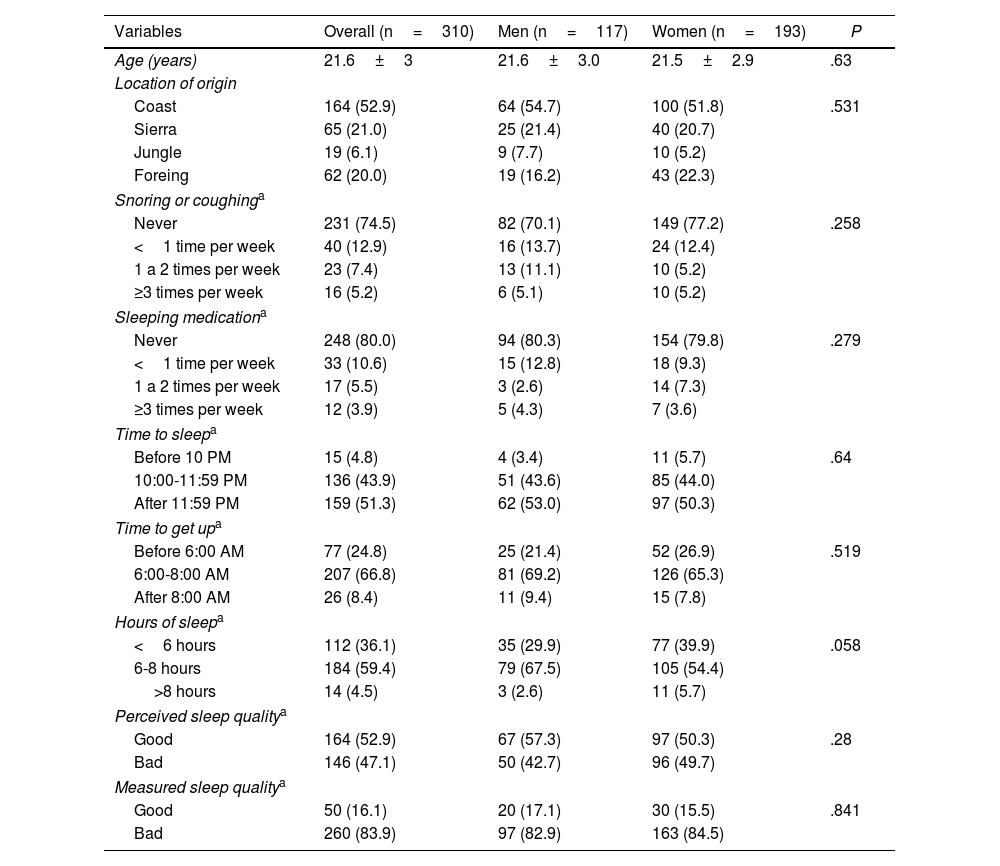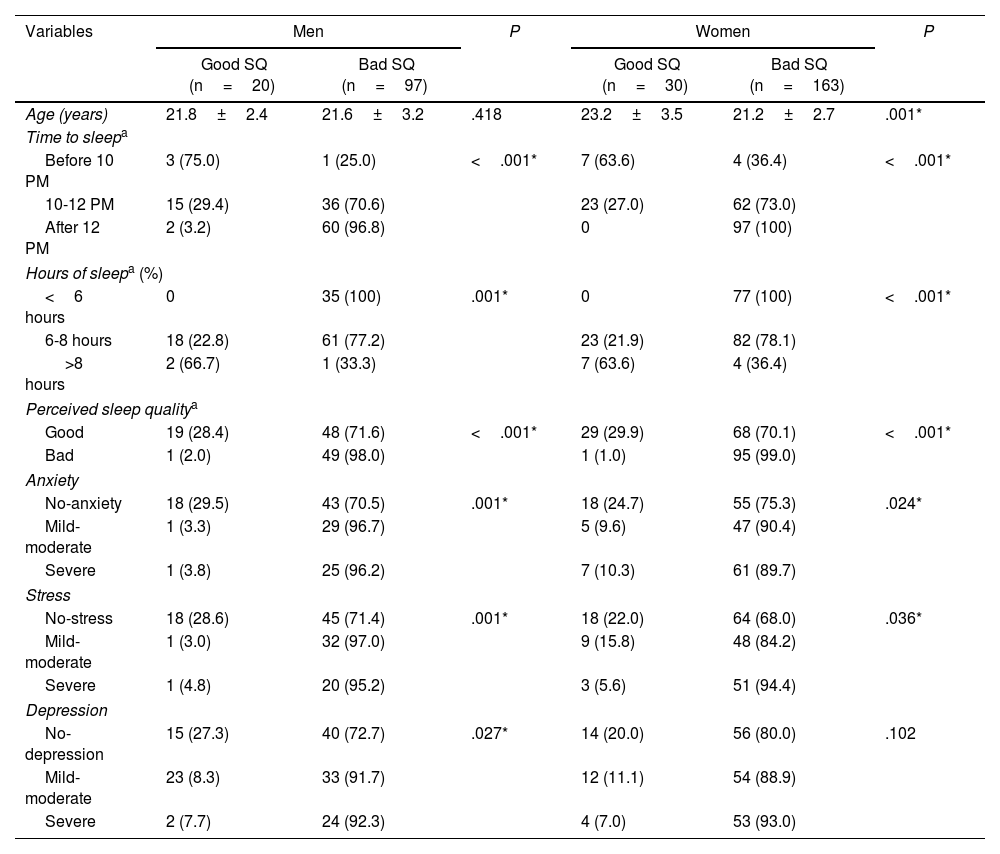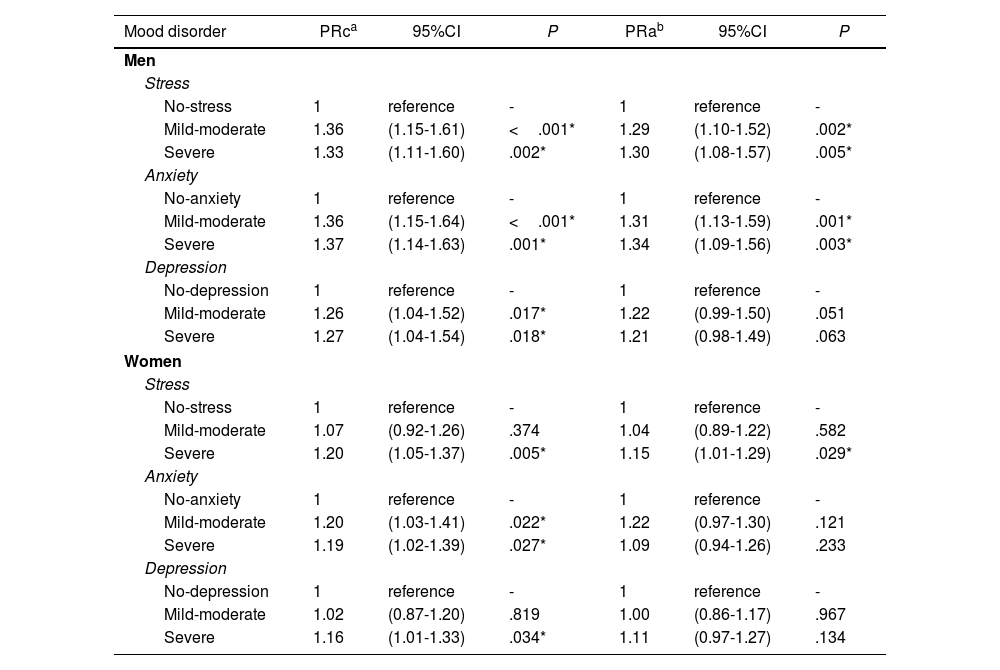The prolongation and consequences of the COVID-19 pandemic have led to an uncertain and devastating panorama in many populations, and the evidence shows a high prevalence of mental health problems in medical students. The objective was to evaluate the association between mood disorders and sleep quality (SQ) in Peruvian medical students during the COVID-19 pandemic.
MethodsA cross-sectional study was conducted on 310 medical students from a private university in Peru. The SQ was measured using the Pittsburgh Sleep Quality Index (PSQI), while mood disorders were evaluated using the Depression Anxiety and Stress Scale-21 (DASS-21). All information was collected by online surveys and then analysed in the R programming language.
ResultsThe SQ results measured by PSQI were poor in 83.9% of the medical students. In the Poison regression analysis, the results of the bivariate analysis in men show that all mood disorders found the prevalence of poor SQ. However, in the multivariate analysis only stress (PRa=1.30; 95% CI, 1.08-1.57; P<0.01) and anxiety (PRa=1.34; 95% CI, 1.09-1.56; P <0.01) increased the prevalence of poor SQ. Women had a similar pattern in bivariate analysis, whereas in multivariate analysis, only severe stress (PRa=1.15; 95% CI, 1.01-1.29; P <0.05) increased the prevalence of poor SQ.
ConclusionsThis study allows us to observe the consequences that the COVID-19 pandemic is having on medical students in Peru. It also revealed a population group vulnerable to poor quality of sleep and bad mood, which in the future will impact on health. It is suggested to educate medical students about the importance of proper sleep hygiene and the consequences of poor sleep hygiene practices.
La prolongación y las consecuencias de la pandemia de COVID-19 generan un panorama incierto y devastador en muchas poblaciones, y la evidencia muestra una alta prevalencia de problemas de salud mental en estudiantes de Medicina. El objetivo del estudio es evaluar la asociación entre los trastornos del estado de ánimo y la calidad del sueño (SQ) en estudiantes de Medicina peruanos durante la pandemia de COVID-19.
MétodosSe realizó un estudio transversal en 310 estudiantes de Medicina de una universidad privada del Perú. El SQ se midió a través del Índice de Calidad del Sueño de Pittsburgh (PSQI), mientras que los trastornos del estado de ánimo se evaluaron mediante la Escala de Depresión, Ansiedad y Estrés-21 (DASS-21). Toda la información se recopiló mediante encuestas en línea y luego se analizó en el lenguaje de programación R.
ResultadosLos resultados de SQ medido por PSQI fue malo en un 83,9% de los estudiantes de Medicina. En el análisis de regresión de Poisson, los resultados del análisis bivariado en varones muestran que todos los trastornos del estado de ánimo aumentan la prevalencia de mala SQ, pero en el análisis multivariado solo el estrés (PRa=1,30; IC95%, 1,08-1,57; p <0,01) y la ansiedad (PRa=1,34; IC95%, 1,09-1,56; p <0,01) aumentaron la prevalencia de mala SQ. Las mujeres tuvieron un patrón similar en el análisis bivariado, pero en el análisis multivariado solo el estrés grave (PRa=1,15; IC95%, 1,01-1,29; p <0,05) aumentó la prevalencia de mala SQ.
ConclusionesEste estudio permite observar las consecuencias de la pandemia COVID-19 en los estudiantes de Medicina de Perú. Se da a conocer que son una población vulnerable a la mala calidad del sueño y el mal humor, lo que en el futuro repercutirá en su salud mental y física y como profesional de la salud. Se propone formar a los estudiantes de Medicina en la importancia de una adecuada higiene del sueño y las consecuencias de las malas prácticas de higiene del sueño.









